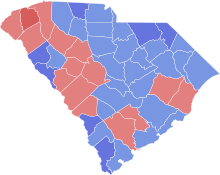Aftermath
Hollings first Senate victory was also his closest and he was easily re-elected in 1968 (full-term), 1974, 1980, and 1986, with somewhat tougher races in 1992 and 1998, although neither with a margin as narrow as that of his initial election. He eventually became the seventh longest-serving senator in history (just behind Robert Byrd, Thurmond, Ted Kennedy, Daniel Inouye, Carl Hayden and John C. Stennis). He and Thurmond were also the longest-serving Senate duo. Because of this, despite his length of service, Hollings spent 36 years as the junior Senator, even though - with his penultimate term - he had gained seniority of all but four of his colleagues - Byrd, Thurmond, Inouye, and Kennedy. Hollings became a nationally important political figure, e.g., serving as Chairman of the Budget committee.
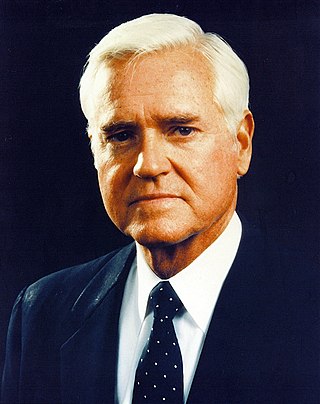
Ernest Frederick "Fritz" Hollings was an American politician who served as a United States senator from South Carolina from 1966 to 2005. A conservative Democrat, he was also the 106th governor of South Carolina, the 77th lieutenant governor of South Carolina, and a member of the South Carolina House of Representatives. He served alongside Democrat-turned-Republican Senator Strom Thurmond for 36 years, making them the longest-serving duo in U.S. Senate history. At the time of his death, he was the oldest living former U.S. senator. As of 2024, he is the last Democrat to hold and/or win a U.S. Senate seat in South Carolina.

The 1998 United States Senate elections were held on November 3, 1998, with the 34 seats of Class 3 contested in regular elections. This was seen as an even contest between the Republican Party and Democratic Party. While the Democrats had to defend more seats up for election, Republican attacks on the morality of President Bill Clinton failed to connect with voters and anticipated Republican gains did not materialize. The Republicans picked open seats up in Ohio and Kentucky and narrowly defeated Democratic incumbent Carol Moseley Braun, but these were cancelled out by the Democrats' gain of an open seat in Indiana and defeats of Republican Senators Al D'Amato and Lauch Faircloth. The balance of the Senate remained unchanged at 55–45 in favor of the Republicans.

The 1978 United States Senate elections were held on November 7, in the middle of Democratic President Jimmy Carter's term. The 33 seats of Class 2 were contested in regular elections. Special elections were also held to fill vacancies.

The 1972 United States Senate elections were held on November 7, with the 33 seats of Class 2 contested in regular elections. They coincided with the landslide re-election of Republican President Richard Nixon. Despite Nixon's landslide victory, Democrats increased their majority by two seats. The Democrats picked up open seats in Kentucky and South Dakota, and defeated four incumbent senators: Gordon Allott of Colorado, J. Caleb Boggs of Delaware, Jack Miller of Iowa, and Margaret Chase Smith of Maine. The Republicans picked up open seats in New Mexico, North Carolina, and Oklahoma, and defeated one incumbent, William B. Spong Jr. of Virginia.

The 1968 United States Senate elections were elections for the United States Senate. Held on November 5, the 34 seats of Class 3 were contested in regular elections. They coincided with the presidential election of the same year. The Republicans picked up five net seats in the Senate. This saw Republicans win a Senate seat in Florida for the first time since Reconstruction.

The 1966 United States Senate elections were elections on November 8, 1966, for the United States Senate which occurred midway through the second term of President Lyndon B. Johnson. The 33 seats of Class 2 were contested in regular elections. Special elections were also held to fill vacancies. With divisions in the Democratic base over the Vietnam War, and with the traditional mid-term advantage of the party not holding the presidency, the Republicans took three Democratic seats, thereby breaking Democrats' 2/3rds supermajority. Despite Republican gains, the balance remained overwhelmingly in favor of the Democrats, who retained a 64–36 majority. Democrats were further reduced to 63–37, following the death of Robert F. Kennedy in June 1968.

The 1962 United States Senate elections was an election for the United States Senate. Held on November 6, the 34 seats of Class 3 were contested in regular elections. Special elections were also held to fill vacancies. They occurred in the middle of President John F. Kennedy's term. His Democratic Party made a net gain of four seats from the Republicans, increasing their control of the Senate to 68–32. However, this was reduced to 67–33 between the election and the next Congress, as on November 18, 1962, Democrat Dennis Chávez, who was not up for election that year, died. He was replaced on November 30, 1962, by Republican appointee Edwin L. Mechem. Additionally, Democrat Strom Thurmond became a Republican in 1964, further reducing Democrats to 66–34. This was the first time since 1932 that Democrats gained seats in this class of Senators.
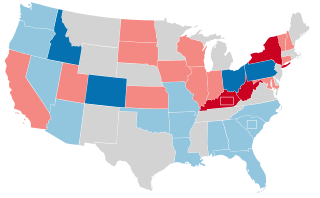
The 1956 United States Senate elections were elections for the United States Senate that coincided with the re-election of President Dwight D. Eisenhower. The 32 seats of Class 3 were contested in regular elections, and three special elections were held to fill vacancies. Although Democrats gained two seats in regular elections, the Republicans gained two seats in special elections, leaving the party balance of the chamber unchanged.

The 1954 United States Senate elections was a midterm election in the first term of Dwight D. Eisenhower's presidency. The 32 Senate seats of Class 2 were contested in regular elections, and six special elections were held to fill vacancies. Eisenhower's Republican party lost a net of two seats to the Democratic opposition. This small change was just enough to give Democrats control of the chamber with the support of an Independent who agreed to caucus with them; he later officially joined the party in April 1955.

The 1954 South Carolina United States Senate election was held on November 2, 1954. Senator Burnet R. Maybank did not face a primary challenge in the summer and was therefore renominated as the Democratic nominee for the election in the fall. However, his death on September 1 left the Democratic Party without a nominee, and the executive committee nominated state Senator Edgar A. Brown as their replacement candidate. Many South Carolinians were outraged by the party's decision to forgo a primary election, and former Governor Strom Thurmond entered the race as a write-in candidate. He easily won the election and became the first U.S. senator to be elected by a write-in vote in an election where other candidates had ballot access. A Senate election where the victor won by a write-in campaign did not happen again until 2010.
Marshall Joyner Parker was a Republican politician from the U.S. state of South Carolina.

The 1996 South Carolina United States Senate election was held on November 5, 1996, to select the U.S. Senator from the state of South Carolina. Popular incumbent Republican Senator Strom Thurmond, won re-election against Democratic challenger Elliott Springs Close for a seventh full term in office. The margin, however, was one of the closest in Thurmond's 48-year Senate career. At the age of 93 years, 11 months and 3 days, Thurmond became the oldest person ever to be re-elected to the United States Senate. He eventually served out the entirety of what would be his final term and left the Senate on January 3, 2003, at age 100 years and 29 days.

The 1998 United States Senate election in South Carolina was held November 3, 1998. Incumbent Senator Fritz Hollings won reelection to his seventh term. As of 2024, this is the last time that a Democrat has won a U.S. Senate election in South Carolina. This is also the last time the Democratic nominee for this Senate seat was a white man, as in future elections Democrats would either nominate a woman and/or a person of color.

The 2002 United States Senate election in South Carolina was held on November 5, 2002. Longtime Republican incumbent Strom Thurmond decided to retire at the age of 100, becoming the first centenarian to ever serve in Congress; he later died in June 2003. Thurmond's record as the longest-serving Senator in U.S. history was later surpassed by West Virginia's Robert Byrd.

The 1966 South Carolina United States Senate election was held on November 8, 1966 to select the U.S. Senator from the state of South Carolina simultaneously with the special election to fill out the remainder of Olin D. Johnston's term.
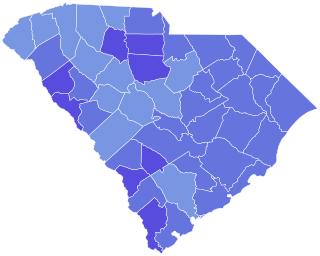
The 1968 South Carolina United States Senate election was held on November 5, 1968, to select the U.S. Senator from the state of South Carolina. Incumbent Democratic Senator Fritz Hollings easily defeated Republican state senator Marshall Parker in a rematch of the election two years earlier to win his second,, term.

The 1962 South Carolina United States Senate election was held on November 6, 1962 to select the U.S. Senator from the state of South Carolina. Incumbent Democratic Senator Olin D. Johnston defeated Governor Fritz Hollings in the Democratic primary and Republican W. D. Workman, Jr. in the general election.

The 1978 South Carolina United States Senate election was held on November 7, 1978, to select the U.S. senator from the state of South Carolina. Popular incumbent Republican Senator Strom Thurmond defeated Democratic challenger Charles D. Ravenel.

The 1950 South Carolina United States Senate election was held on November 7, 1950, to select the U.S. Senator from the state of South Carolina. Incumbent Democratic Senator Olin D. Johnston defeated Strom Thurmond in a bitterly contested Democratic primary on July 11 and was unopposed in the general election.
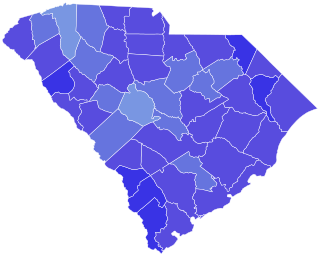
The 1974 South Carolina United States Senate election was held on November 5, 1974, to select the U.S. Senator from the state of South Carolina. Incumbent Democratic Senator Fritz Hollings easily defeated Republican challenger Gwen Bush to win his third term.
